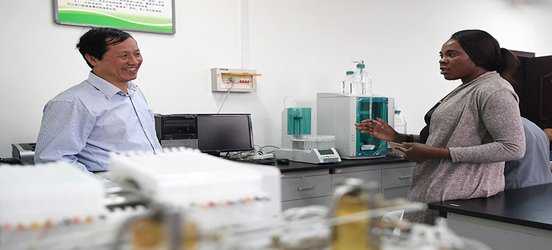China to train African scientists as part of $60-billion development plan

China wants to train Africa’s next generation of scientists. Its lofty goal is to improve African science in fields from agriculture and climate change to quantum physics and artificial intelligence.
The training is one element of a much larger plan adopted by Chinese and African leaders at the third Summit of the Forum on China–Africa Cooperation in Beijing last month. Chinese President Xi Jinping has pledged US$50 billion in grants and loans for infrastructure projects, medical programmes, clean-energy initiatives and other projects in Africa. Chinese companies will invest another $10 billion. The amount dedicated to training scientists is not known.
But some policy experts and scientists worry that African nations might become too reliant on other countries to provide training. Others doubt that the initiatives will truly boost African science, as similar projects planned at past forums have yet to produce noticeable benefits.
Few details have been released about how the money will be distributed among countries. But the division is likely to be controversial, says Lina Benabdallah, who studies Chinese foreign policy in Africa at Wake Forest University in Winston-Salem, North Carolina. “It will be up to African leaders, political elites and their constituents to press for specific programmes to happen,” she says.
Research training
Training is a pillar of the new plan. China will offer 50,000 scholarships for African people, including scientists, to study in China, and will provide short-term training opportunities for another 50,000 people to travel to seminars and workshops.
The action plan also offers scholarships for postgraduate training in China and at African institutions, such as the Sino-Africa Joint Research Centre at the Jomo Kenyatta University of Agriculture and Technology in Juja, Kenya. The centre, which opened in 2013, collaborates with Wuhan Botanical Garden in China and has produced dozens of academic papers in fields including biodiversity and climate-change monitoring.
China will also support a major expansion of the University of Health and Allied Sciences, a modern biomedical training institution in Ho, Ghana, which the country gave US$20 million in 2015.
“Developing indigenous talents locally is extremely important to the future of science in Africa,” says Tommy Karikari, a neurology researcher from Ghana who works at the University of Gothenburg in Sweden. The latest plan will dramatically expand training opportunities for African scientists, he says.
Karikari says that local scholarships and training facilities are important to ensure that some researchers stay in Africa. Many people currently train abroad because of a lack of opportunities on the continent, says Karikari. “It is expensive, and many beneficiaries do not return home, which affects the pool of trained scientists in Africa,” he says.
Benabdallah says the summit focused particularly on ways to include African scientists in China’s global diplomacy programme, the Belt and Road initiative. For example, the plan encourages researchers in Africa to join the Young Scientists Exchange Program, which pays for scientists to study in China for up to a year.
China has also promised to help countries develop real-world applications in quantum physics and artificial intelligence. But Benabdallah says there is a risk that African nations might become too dependent on other countries to provide training and skills. It is important for African nations to be producers of science and technology, not just consumers, she says.
Agriculture focus
The plan also reaffirms China’s decades-long commitment to help improve agricultural science and practices and environmental protection in Africa. Analysts characterize this investment as a mix of profit-seeking, philanthropy and food security, as China seeks grains and oilseeds that it can bring back home.
The plan calls for new centres for joint research in environmental issues and geoscience, although their locations are yet to be announced. Other programmes will focus on safeguarding biodiversity and combating climate change and desertification. Five hundred senior agriculture experts from China will also be sent to Africa to help modernize agricultural practices.
But Ademola Adenle, who studies sustainable development at Colorado State University in Fort Collins, is sceptical about China’s intentions. He says little knowledge has been gained from the more than 20 Chinese-government-funded agricultural-technology development centres created throughout Africa since 2006. The centres lack transparency and mainly represent Chinese commercial interests, he says. One of them reportedly sells farm equipment, mushroom powder and dried mushrooms to local people.
“Since this initiative kicked off, I am not aware of any significant breakthrough in agriculture research and development or any type of innovation that could transform agricultural development,” he says.
China's agriculture ministry did not respond to questions about the agricultural-technology centres by Nature's deadline.
Adenle hopes that the forum will result in training for agricultural scientists to improve local farming techniques. But if these initiatives just give China more access to Africa’s natural resources, it could spell doom for the continent, he says.
For China’s investments to help Africans harness science and technology, there will need to be more public discussion of the trade agreements and political deals as they're worked out. “There is no doubt that China has invested a lot of money in Africa,” he says. “But we need more transparency.”
